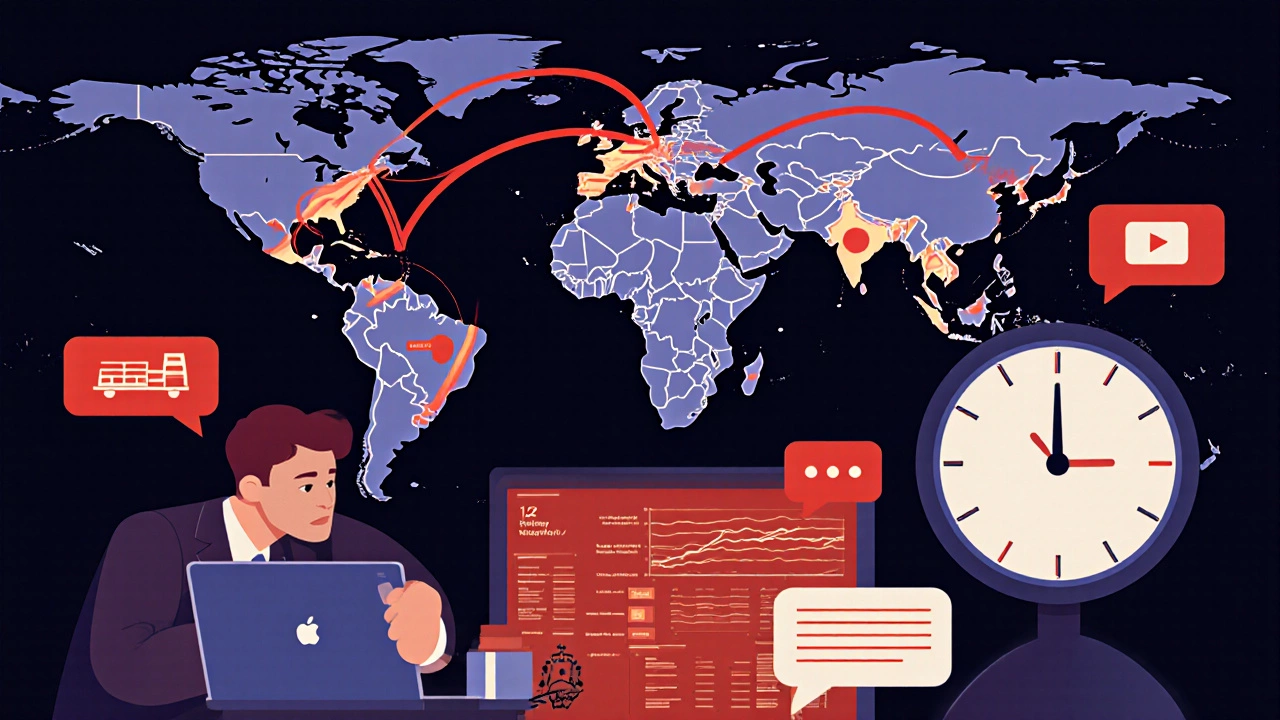Freight Forwarding Stress Assessment Tool
How Stressful Is Your Freight Forwarding Role?
Answer these questions to assess your current stress level based on key factors mentioned in the article.
Your Stress Assessment Result
When people hear Freight forwarding is a logistics service that coordinates the movement of goods across borders, handling documentation, carrier selection, and customs clearance, they often picture busy warehouses and endless paperwork. But is the day‑to‑day reality as stressful as the stereotype suggests?
What a Freight Forwarder Actually Does
A freight forwarder acts like a personal travel agent for cargo. They bundle shipments, negotiate rates with carriers, prepare bills of lading, and keep an eye on customs regulations. The role sits at the intersection of freight forwarding stress and problem‑solving, requiring both big‑picture thinking and attention to tiny details. In 2024, the International Federation of Freight Forwarders reported that 62% of forwarders handle more than 30 shipments daily, meaning multitasking is the norm.
Key Stress Triggers
- Documentation overload: Each shipment needs commercial invoices, packing lists, export licenses, and sometimes hazardous‑material certificates.
- Carrier reliability: A delayed vessel can cascade into missed delivery windows for dozens of clients.
- Regulatory changes: New tariffs or customs procedures can appear overnight, forcing rapid re‑training.
- Customer expectations: Shippers now expect real‑time tracking and instant updates, raising the bar for responsiveness.
How Tight Deadlines Add Pressure
Most freight forwarders work on "just‑in‑time" schedules. A single hiccup-say, a missing export license-can push a delivery from Tuesday to Friday, costing the shipper penalties and damaging reputation. In a survey of 1,200 logistics professionals, 48% said they felt “chronically rushed” because of these tight windows.
Regulatory and Customs Complications
Customs clearance is a moving target. In the UK, post‑Brexit rule changes introduced new Origin Declaration Requirements (ODR). Forwarders who fail to submit accurate data face fines up to £5,000 per shipment. The need to stay current with dozens of national regulations makes the job feel like a perpetual exam.

Balancing Multiple Time Zones and Cultures
Coordinating a shipment from Shanghai to Liverpool means juggling three time zones, language nuances, and differing business etiquette. A missed email at 5pm GMT can become a 9am call in Shanghai, disrupting the workflow and adding mental fatigue.
Technology - Help or Hindrance?
Modern freight forwarders rely on transport management systems (TMS), AI‑driven rate calculators, and cloud‑based document hubs. While these tools reduce manual entry, they also introduce new stressors: system outages, data migration headaches, and the constant pressure to learn updated interfaces. A 2025 report from Gartner showed that 34% of logistics firms experienced a major TMS downtime at least once a year.
Real‑World Stories from the Front Line
Laura, a senior forwarder in Liverpool, shares that a sudden carrier strike in the North Sea once forced her to reroute 45 containers within 12 hours. "I was on the phone with the shipper, the carrier, customs, and my manager all at once. My heart was pounding the whole night," she recalls. Such anecdotes illustrate how a single event can spike stress levels dramatically.

Practical Ways to Reduce Stress
- Standardize templates: Use pre‑filled invoice and pack‑list templates to cut documentation time by up to 30%.
- Build carrier buffers: Keep a shortlist of backup carriers; a 10% buffer can absorb most delays.
- Invest in training: Quarterly regulatory workshops keep the team ahead of new customs rules.
- Leverage analytics: TMS dashboards that flag shipments approaching risk thresholds let you act before crises emerge.
- Prioritize mental health: Encourage short breaks, use mindfulness apps, and set realistic response‑time expectations with clients.
When the Job Becomes Unsustainable
If burnout signs appear-persistent fatigue, irritability, or declining accuracy-it's time to reassess. Some forwarders transition into specialized roles like customs brokerage or supply‑chain consulting, where the pressure is more predictable.
Bottom Line: Is It Worth It?
Freight forwarding can be high‑pressure, but the same intensity brings high rewards: global exposure, lucrative commissions, and the satisfaction of moving goods that keep economies humming. By mastering documentation, building strong carrier relationships, and using technology wisely, the stress can be managed rather than eliminated.
| Stress Source | Typical Frequency | Impact Level |
|---|---|---|
| Document Errors | High | Medium |
| Carrier Delays | Medium | High |
| Customs Changes | Low | High |
| Client Urgency | High | Medium |
Frequently Asked Questions
What are the main causes of stress for freight forwarders?
The biggest stressors are documentation mistakes, carrier reliability, sudden regulatory changes, and tight delivery windows imposed by clients.
Can technology actually increase stress?
Yes, when systems crash or require constant learning. However, well‑implemented TMS tools can also automate repetitive tasks and lower stress when used correctly.
How often do freight forwarders work overtime?
Surveys show that about 42% of forwarders log overtime at least three times a week, especially during peak season or when handling high‑value shipments.
What skills help reduce job stress?
Strong organization, clear communication, knowledge of customs regulations, and the ability to use TMS dashboards effectively are key stress‑mitigating skills.
Is a career in freight forwarding still a good choice in 2025?
Despite the pressure, the field remains lucrative and globally relevant. Professionals who invest in continuous learning and smart tech adoption find the role both rewarding and sustainable.


